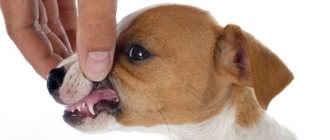Breeding a breed is a responsible and painstaking task that involves you in all aspects of the life of a particular animal. To get good results, breeders need to know how long pregnancy lasts in dogs, how it progresses, and what care the bitch needs. The expectant mother will need the help and support of the owner at every stage of pregnancy. Left unattended, it may not be able to withstand the load and suffer from complications.
How to tell if a dog is pregnant or not
Signs of pregnancy appear in dogs 2-3 weeks after mating. These include:
- nipple enlargement;
- changes in eating behavior;
- unusual aggression and isolation or, conversely, excessive attention to the owner;
- drowsiness;
- decreased activity;
- signs of toxicosis;
- increased frequency of urination, incontinence;
- clear vaginal discharge;
- increase in abdominal volume.
If mating has occurred, and there are no signs of pregnancy within a month, the dog can be taken to a veterinarian who knows how to understand that the dog is pregnant. He will take a blood test and accurately determine whether your pet is expecting puppies.
Signs of an interesting situation
It is quite difficult to guess that a pet is carrying puppies in the early stages. At first, only behavioral changes are noted that are noticeable to attentive owners. The expectant mother becomes inactive and refuses long walks. She gets nervous in noisy companies and tries to find a secluded place. Her appetite increases or decreases sharply, and she often vomits in the morning.
After detecting these symptoms, be sure to visit a veterinary clinic. More obvious signs appear only a month after fertilization. A pregnant woman's belly becomes rounded and enlarged. Viscous mucus is released from her loop, and the nipples swell.
By the end of 2 months, babies can be palpated, but this is recommended only under the supervision of a veterinarian. Fragile fruits are easy to injure, so avoid self-examination.
Duration of pregnancy in different dogs
How long a dog bears puppies depends on the breed of the pet. The larger the breed, the more time it takes to form the fetus. On average, pregnancy lasts up to 60 days for small dogs, up to 65 for medium-sized dogs, and up to 72 for large dogs. The period is counted from the last mating.
| Pekingese | 55-56 days |
| Yorkshire Terrier | 54-57 days |
| Chihuahua | 53-55 days |
| Jack Russell Terrier | 57-60 days |
| Boxer | 60-61 days |
| Spaniel | 60-63 days |
| Basset | 59-62 days |
| Husky | 62-64 days |
| Fox terrier | 61-63 days |
| Wolfhound | 63-69 days |
| Newfoundland | 65-70 days |
| Mastiff | 68-69 days |
| Great Dane | 69-71 days |
| German Shepherd | 68-70 days |
The timing of how long pregnant dogs walk is approximate - the exact duration of gestation of puppies depends on the size of the mother, her diet, lifestyle, activity, and heredity.
Factors influencing gestational age
The duration of gestation of puppies depends on many factors.
- Number of previous births. The first pregnancy will be significantly longer than subsequent ones. The difference can be up to 7 days.
- Pet activity. If the dog is active, she will most likely give birth to puppies earlier.
- Age and size. Small dogs give birth faster than large ones. And animals aged 7-8 years bear their offspring longer.
- Number of puppies. The more puppies in the litter, the shorter the pregnancy. If there are few of them, they grow larger and take longer to form.
Labor did not start on time
It may happen that the dog's pregnancy has already passed, but labor does not begin. This often happens during the first pregnancy and in older dogs. This option is also possible if pregnancy occurs with pathologies.
In this case, you need to contact a veterinarian who will examine the pet, determine its condition and, if necessary, prescribe induction of pregnancy. If this is not done, inflammatory processes may begin: then both the puppies and their mother will die.
What you will need
What else is needed to deliver a dog at home? A standard obstetric kit includes the following:
- box for newborn puppies;
- oilcloth and sheet;
- thermometers (medical and room);
- warmer;
- syringes, tweezers, pipettes, scissors;
- cotton wool;
- tray;
- gauze napkins;
- soft diapers;
- silk threads soaked in alcohol or vodka;
- watch;
- multi-colored woolen threads;
- small scales;
- notepad with pen.
How to care for a pregnant dog
In order for the pregnancy to be easy and the offspring to be born healthy, the dog must be given special care.
Feeding
The feeding regimen after pregnancy will have to be adjusted, because now the dog must provide all its offspring with useful substances. But you need to change the diet only 3-4 weeks after mating and pregnancy - if you overfeed your pet, she may have a miscarriage, become obese, and worsen chronic diseases.
After the first month of pregnancy, the amount of food should be gradually increased. By the time of delivery, half the standard volume should be added to the serving size. If your dog refuses to eat, you should not force him to eat. It is better to carefully monitor her behavior and feed her as soon as her appetite awakens.
If your dog has a balanced diet, then there is no need to change it or introduce new foods. For animals on ready-made food, you need to switch to special mixtures for pregnant women - they contain all the useful substances necessary for this situation. For those who eat natural food, it is better to start giving special vitamins. They are prescribed only by a doctor.
During pregnancy, dogs often become thirsty, so you need to provide them with constant access to water. It is better to place several additional drinking bowls around the apartment, especially in those places where your pet most often visits. The water needs to be changed every 12 hours.
Walking and activity
A pregnant dog definitely needs to go for a walk to breathe fresh air, gain strength and relax. Because of their position, they get tired faster, so long hikes should be avoided. It is better to walk more often, but less time.
You also need to monitor the dog’s activity while walking. Most often, they themselves feel when they need to run less, but young animals can overestimate their position. In this case, it is better to take the pet home. Also, you should not allow your dog to play with other animals - they can accidentally harm it and even cause a miscarriage.
Hygiene
A pregnant dog’s hygiene needs to be monitored more carefully, since due to its position it is more difficult for it to take care of itself. It is better not to bathe her unless absolutely necessary - choosing the appropriate water temperature will be difficult, especially since not everyone can easily tolerate water treatments.
You especially need to monitor her genitals - clear liquid may be released from them. If the dog does not lick itself, then you need to wash it with warm water. This should not be done two weeks before giving birth.
Some people may experience incontinence during pregnancy. You cannot scold an animal for this; you need to clean up after it as quickly as possible so as not to provoke the appearance of parasites. After giving birth, the dog's behavior will return to normal.
Preparing for childbirth
Further, knowing how long a dog carries puppies , labor may begin suddenly, and the owners may not have enough time to quickly collect everything they need. Therefore, tools need to be prepared in advance. For everything to go smoothly, you will need:
- clean towels;
- gloves;
- cotton wool;
- alcohol;
- a box lined with unwanted blankets;
- scales for weighing puppies.
Sometimes the intervention of a veterinarian may be necessary, so you need to find one in advance and agree on a possible call. You cannot do without the help of specialists if the dog is small, the pregnancy was difficult, or complications arose during previous births.
Pathologies of pregnancy in dogs
Despite the fact that most often pregnancy and childbirth go smoothly, you need to be prepared for sudden situations.
Ectopic pregnancy
A pregnancy is called ectopic if one or more fetuses develop in the body rather than in the uterus. This is a dangerous condition that can threaten the life and health of both the mother and offspring. It manifests itself as severe toxicosis, pain, and a noticeable decrease in the animal’s activity. In this case, you need to contact a veterinarian: he will be able to alleviate the pet’s condition, explain how to behave in this situation, and deliver the baby as safely as possible.
False pupishness
In this state, the dog behaves as if it were pregnant, but it is not expecting puppies. This can happen either after an unsuccessful mating or in the absence of sexual intercourse. Your pet should definitely be shown to a doctor: this is a sign of hormonal problems that can cause serious illness.
Frozen pregnancy
With this diagnosis, pregnancy begins normally, but for some reason the puppies die in the womb. If you do not get rid of them, the dog will become inflamed and die. Signs of fading include:
- temperature increase;
- vomiting or diarrhea;
- lack of movement in the abdomen.
If such symptoms appear, you need to show the animal to a veterinarian as soon as possible.
If the dog paces
If labor does not occur 65-70 days after the last mating, you should consult a doctor. He will determine the reasons for the delay and, if necessary, stimulate the labor process. Under no circumstances should you try to provoke it at home, either with pills or mechanical force.
Possible complications
What else do you need to know about the birthing process in dogs? The owner should also have an idea of possible complications. This will help you not to get confused in a critical situation and come to the animal’s aid in a timely manner.
- Dead puppy. If during pushing you can see a baby who shows no signs of life, you need to pull him out during the next series of pushing. Otherwise, the remaining puppies will suffocate in the birth canal.
- Retained placenta. What to do if the afterbirth does not come off? In this case, two to five hours after birth, the mother must be given an injection of oxytocin. Then you need to put the dog in the bath on its hind legs, direct a stream of warm water to its stomach. At the same time, you need to do a light abdominal massage, moving from top to bottom.
- Stuck puppy. Such a nuisance can occur as a result of spasms of the vaginal muscles. An injection of an antispasmodic drug given to the mother will help save the baby. Then you should wait until the muscles relax completely. If nothing changes, you need to insert a finger into the vagina during the next attempts (under the puppy or to the side of him).
- A puppy walking the wrong way. The baby can move its neck to the mother's pelvic opening if its head is turned inward. In this case, the dog will not be able to give birth on its own; the help of a veterinarian is required.
- Large puppy. If the baby is too big and does not move out, you should insert your finger into the vagina and, during the next attempts, push it towards you. You need to act in a so-called arc - first towards yourself, and then down.
- Weak labor. Weakening or cessation of contractions and pushing - what to do in this case? You can use a stimulator or perform a caesarean section.
When to deworm a pregnant dog
It is not recommended to give deworming tablets to a dog in this position. It is better to carry out the treatment at least 14 days before mating. If this was not done on time, it is better to postpone the procedure until after childbirth. If worms cause severe discomfort to the animal, you can give her tablets no earlier than after the 40th day after mating. Under no circumstances should you buy the pills yourself. First you need to show your pet to a doctor: he will determine the need for treatment and select a special drug that will not harm the puppies.
Vaccinations, antiparasitic treatment and treatment during pregnancy
Vaccination is carried out strictly before mating, since the administered drugs can cause abnormalities in development or death of the fetus. Mother's immunity is transferred to babies during feeding and lasts up to 2-2.5 months.
Treatment against parasites is also recommended before mating, namely 14 days before the meeting of future partners. Anthelmintics are quite toxic, so they can negatively affect the health of puppies. Pregnant bitches are only allowed to take anthelmintic drugs if they are directly infected. In this case, the animal is given more gentle anthelmintics: Milbemax, Prazitel, Drontal Plus.
Any treatment is carried out only under the guidance of a veterinarian. The drugs are selected individually, taking into account their effect on the body of the expectant mother and her babies.
Termination of pregnancy in dogs
Sometimes the owners decide to terminate the pregnancy. This is used if the pet runs away during heat, if the pregnancy is not proceeding correctly, or in the event of a mating of a small bitch with a large male. The procedure cannot be carried out without a doctor’s prescription - this can lead to complications and even death of the animal.
The easiest way is hormone therapy. The veterinarian gives pills that prevent the fetus from implanting in the uterus, and abortion occurs within 7 days. The procedure is carried out only in the first month, it does not harm health and does not interfere with further reproduction. In some cases, surgery is performed to remove the fetuses. This is more dangerous and is most often carried out only for health reasons - in case of a frozen or large pregnancy.
Feeding newborns
What else should an owner who is about to deliver a dog for the first time know? Puppies are born blind and deaf. However, this does not prevent babies from finding their mother’s breast from the first days of life. During the feeding process, they push off the floor with their hind paws and massage the dog’s belly. This provides stimulation to the nipples, which is very important for milk production.
Eating colostrum is the key to the health of newborn puppies. Thanks to this, nutrients and protein globulins will enter the body, preventing the development of infectious diseases.
It may happen that the new mother does not have milk or does not allow the puppies to come near her. In this case, a specially adapted mixture will come to the rescue, which is sold in a veterinary pharmacy in the form of powdered milk. Instructions for its preparation are on the package. You can also beat a chicken egg and mix with one hundred grams of fresh cow's milk, and then strain the mixture through several layers of clean gauze. If newborns are weakened, you need to add 3 ml of ascorbic acid, 20 ml of glucose and a little cream to this recipe. A special feeding bottle can also be purchased at a veterinary pharmacy. In a pinch, an ordinary baby bottle will do. Newborns are fed every 2-3 hours. For babies who are already a month old, 5-6 meals a day are enough.
Last days before giving birth
Before giving birth, the dog's behavior changes. She sleeps more, doesn’t want to go outside, and doesn’t move much. Animals often scratch with their claws, looking for a secluded corner to give birth to their offspring. At this time, it is imperative to arrange a comfortable place for childbirth and get used to it. Within a few days, the animals become calmer, and immediately before contractions, on the contrary, they become restless and nervous. The owner should be nearby, but not worry the dog or intrude. You should not force feed her or take her for a walk.
How many puppies does a dog give birth to?
On average, bitches give birth to 3 to 8 puppies, but the exact number depends on the circumstances and the breed. During the first pregnancy, 1-3 babies are most often born, and in subsequent ones - 5-6. With age, the female's fertility decreases again.
It is believed that the smaller the dog, the fewer puppies it will produce. They rarely give birth to more than 3-4 young. The exceptions are Jack Russells, Pekingese and Dachshunds - they can bring 6-7 kids.
Large dogs can give birth to up to 10 puppies. This litter is most often found in Labradors, Shepherds, Alabais, and St. Bernards. Other breeds are limited to 8-9 kids. But Dalmatians are considered the most fertile - they can give birth to even 13-15 puppies.
Pregnancy in a dog is an exciting event for which you need to be well prepared. Your pet needs to be fed more, not worried and not physically stressed. And in order to have time to prepare for childbirth, you need to know how long a dog’s pregnancy lasts: it depends on the breed, age and number of puppies in the litter.
Size matters
Will the animal need the owner's help? Childbirth in large breed dogs usually does not require intervention. Such individuals are quite capable of resolving on their own. It should be taken into account that they usually give birth to fewer puppies than representatives of “compact” breeds. It is necessary to provide assistance to the animal only if the birth is too prolonged.
What can be said about childbirth in small breed dogs? They are also able to cope on their own. Little is required from the owner - accept the puppies, cut the umbilical cords. However, the birth process can also be delayed, resulting in the need for intervention.











